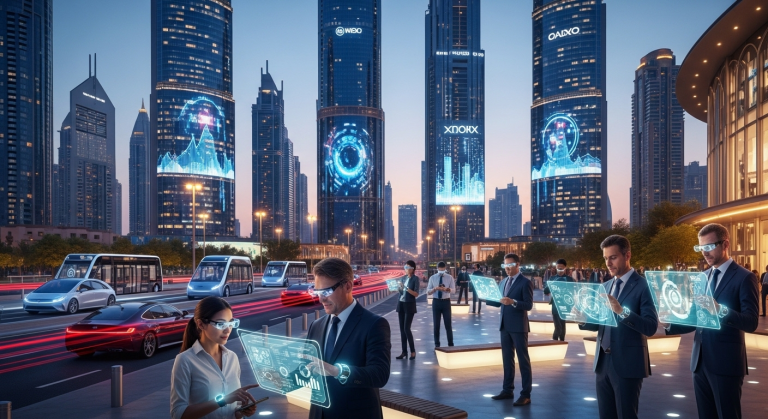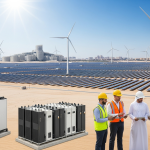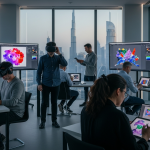Market Analysis and Opportunities
Dubai stands as a dynamic hub for innovation, urban transformation, and digital integration, making it a leading city in the adoption of smart city technologies. With the UAE government’s strategic focus on digital transformation and sustainable urban development, the market for Smart city technology solutions providers in Dubai is expanding rapidly. This section provides a comprehensive UAE market analysis, highlighting target sectors, growth drivers, consumer trends, and the marketing needs critical for success.
Target Market Analysis
Market Size and Growth Rate
- The UAE smart city market is projected to surpass AED 25 billion ($6.8 billion) by 2026, with Dubai contributing an estimated 55% of this value (Frost & Sullivan, 2023).
- The sector’s CAGR is estimated at 13.8%, driven by large-scale government initiatives such as the Dubai Smart City initiative, Expo 2020 legacy projects, and Vision 2030.
Key Consumer Segments and Behavior
- Government Entities: Major consumers investing in IoT-enabled infrastructure for traffic, public safety, sustainable energy, and waste management.
- Enterprises: Demand for analytics, energy management, security solutions, and workplace automation is rising among real estate developers, utilities, and property management firms.
- Residents and End-Users: Increasing adoption of smart home solutions, remote monitoring, and app-based urban mobility reflects a digitally-minded, affluent population.
Industry Trends Shaping the Market
- Rapid urbanization and a high influx of expatriates are boosting demand for optimized city services and seamless connectivity.
- Government-driven digital transformation (e.g., 100% paperless governance by 2023) is accelerating IoT, AI, and big data integration.
- Growing sustainability concerns are driving investments in green technologies, renewable energy, and eco-friendly urban mobility (UAE Vision 2030).
- Strong public-private partnerships (PPPs) in ICT and infrastructure development are common in Dubai, opening doors for international solution providers.
Marketing Needs and Strategies
- Market Research: Ongoing research is vital to map regulatory shifts, competitor moves, and emerging customer demands within Dubai’s fast-evolving landscape.
- Digital Campaigns: Investing in search engine optimization (SEO), pay-per-click (PPC), and localized social media campaigns can maximize online visibility and brand trust.
- Brand Building: High-quality thought leadership content (such as partnering with leading industry blogs or smart city business news platforms) can strengthen positioning as an innovation leader.
- Networking Events: Participation in events like GITEX, Expo legacy symposiums, and government innovation forums helps establish authority and build local partnerships.
Expansion Potential in the UAE and GCC
- Sectors such as smart transportation, intelligent buildings, and urban IoT solutions present ripe opportunities in Abu Dhabi, Sharjah, and other UAE emirates.
- Regional exports of proprietary smart city technology to neighboring GCC markets (e.g., Saudi Arabia’s NEOM project, Qatar’s Smart City program) offer lucrative scaling avenues.
- Potential for diversifying into both B2B (e.g., government contracts, utilities, developers) and B2C (e.g., smart home, mobility apps) offerings.
Comprehensive Business Overview
A Smart city technology solutions provider operates at the intersection of technology and urban development, designing and deploying digital infrastructure to optimize city life. In the context of the UAE, and specifically business in Dubai, such providers offer a portfolio of services and products—ranging from IoT platforms, smart energy grids, AI-driven analytics, to integrated transportation and environmental monitoring systems.
Industry and Business Model
Industry: Urban technology, digital infrastructure, and information and communication technology (ICT).
Business Model:
- Project-based (custom solutions for government/enterprise clients)
- Subscription services (cloud-based analytics, SaaS smart management)
- Product sales (sensors, controllers, networking hardware)
- Consulting and integration services
Target Audience:
- Dubai municipal authorities, utility providers, and large real estate developers
- Commercial building managers and business districts
- Corporate clients aiming for smart office environments
- High-tech residential communities and UAE-based consumers
Operational Scope:
- Location: Dubai Free Zone is often the preferred setup due to a conducive regulatory environment, international ownership, and tax benefits.
- Business Stage: Typically at the startup or growth stage, as the market segment experiences rapid expansion and innovation-driven competition.
Mission, Vision, and Core Objectives
- Mission: To enable sustainable, efficient, and intelligent urban ecosystems in the UAE through advanced digital technology and smart solutions.
- Vision: To become Dubai’s leading provider of integrated smart city technologies, contributing measurably to urban sustainability and quality of life.
- Objectives:
- Deliver scalable and future-ready smart city systems
- Forge strong partnerships with governments and private sector leaders
- Drive innovation through R&D and thought leadership
Competitive Advantage
Unique Value Proposition (UVP) and Key Strengths
For Entrepreneurs
- Dubai is an early adopter, providing fertile ground for innovation in urban tech and smart systems.
- Ability to tap into government-backed funding, innovation grants, and PPPs.
- Entrepreneurs can leverage Free Zone business setup processes for 100% ownership, simplified operations, and market accessibility. See business setup support services tailored for smart city startups.
For Investors
- Proven market demand supported by robust government spending and clear digital transformation agendas.
- High scalability: Solutions can expand to multiple districts, other emirates, and international cities, maximizing ROI.
- Recurring revenue models (SaaS, managed services) enhance financial predictability and investment attractiveness.
For Managers
- Strategic access to skilled global talent and technology innovation labs in Dubai.
- Proprietary technology platforms and exclusive partnerships (e.g., pilot projects with DEWA or RTA) ensure competitive edge.
- Efficient supply chains and availability of advanced infrastructure allow for optimized project delivery.
Evidence-Based Examples
- Exclusive Partnerships: Firms like Du, Etisalat Digital, and IBM have established exclusive partnerships with Dubai Smart City and DEWA to implement cloud-based urban platforms.
- Proprietary Tech: UAE startups deploying in-house AI algorithms for energy-saving systems are gaining traction in Dubai’s commercial real estate market.
- Cost Advantages: Free Zone operations offer zero income tax and customs duty waivers—enhancing cost-efficiency and shareholder returns.
Financial and Investment Needs
Financial Requirements and Costs
- Setup Capital: AED 500,000 to 1,200,000 for initial setup, licensing, office space, and core equipment (varies by scale and Free Zone/Mainland choice).
- R&D and Prototyping: AED 200,000 to 700,000 for piloting smart systems and developing software platforms.
- Staffing and Salaries: AED 100,000–250,000/month for key personnel (engineers, sales, project managers, support staff).
- Marketing and Branding: AED 150,000–400,000/year for sustained promotion, digital campaigns, and branding.
- Infrastructure: AED 120,000–300,000/year for office leases, equipment, cloud services, and utilities.
Investment Potential
- ROI Opportunities: Investors can expect double-digit annual returns once scale is achieved, with 3–5 year payback periods typical for digital tech companies in Dubai.
- Investment Models: Equity investments are common; venture capital for tech growth; debt financing for asset-heavy deployments (e.g., IoT networks).
- Market Demand: Ongoing infrastructure projects, ambitious city master plans, and regulatory incentives ensure robust, long-term demand for smart solutions.
Financial Risks and Mitigation
- Cash Flow Pressures: Upfront project costs and delayed large tenders can impact liquidity. Solution: Diversify revenue with smaller SaaS and maintenance contracts.
- Currency Volatility: Currency fluctuations can affect international procurement. Solution: Multi-currency accounts and forward contracts.
- High Setup Costs: Initial capital burden can be daunting. Solution: Incremental scaling and leasing options.
- Legal and Compliance Risks: Necessity for comprehensive legal safeguards, IP, and liability insurance.
Human Resources and Recruitment
Workforce Needs
- Core Roles: IoT engineers, software developers, data analysts, project managers, technical support, marketing and sales professionals.
- Team Size: 15–35 full-time employees for a startup operation, with scope for scaling up based on project pipeline.
- Specialized Skills: AI/ML expertise, cybersecurity, cloud architecture, urban planning, and Arabic/English bilingual professionals are highly desirable.
HR Challenges and Solutions
- High competition from global firms for experienced tech talent.
- Retention and training: Firms must offer competitive salaries, performance-based incentives, professional certifications, and clear career growth paths.
- Local Emiratization requirements may mandate hiring or training UAE nationals.
Compliance with UAE Labor Laws
- Strict visa sponsorship processes for expatriates, with documentation handled via government e-portals.
- Labor contracts must specify working hours, benefits, annual leave, and end-of-service gratuity.
- Strict adherence to anti-discrimination and workplace safety standards.
- Recommendation: Regular HR audits, legal consultations, and HRMS systems to ensure streamlined compliance and payroll functions.
Infrastructure and Operations
Infrastructure Needs
- Flexible office spaces: Co-working spaces or Free Zone incubators reduce initial costs and provide shared resources.
- Robust IT infrastructure: Cloud-based ERP and collaboration tools, secure networks, dedicated IoT development labs, and reliable data centers.
- Equipment: Advanced laptops, testing devices, smart sensors, networking hardware.
Operational Optimization
- Automation: Implement SaaS-based project management, ticketing, and progress tracking solutions to boost delivery speed and quality.
- Supplier Management: Establish partnerships with reliable local and global suppliers of IoT hardware and software components.
- Continuous Process Improvement: Adopt lean management to eliminate waste and boost productivity.
Legal Compliance
- Timely company registration with DED or Free Zone authorities.
- Acquisition of appropriate business, ICT, and engineering licenses.
- Corporate bank accounts with UAE-based institutions for smooth financial operations.
- Professional consulting can expedite compliance in Dubai’s dynamic regulatory landscape.
Innovation and Technology Adoption
- Investment in AI, blockchain for secure data sharing, and digital twins for modeling urban systems.
- Mobile app development for citizen engagement, city services, and smart payment solutions.
- R&D partnerships with universities and local tech accelerators enhance innovation output.
Marketing and Branding Strategies
Brand Status and Improvement
- Brand Awareness: Establish thought leadership via blogs, local news, and case studies on success stories (see latest industry updates at Dubai smart solutions news).
- Market Positioning: Position as a trusted enabler of Dubai’s Smart City vision, emphasizing reliability, scalability, and sustainable impact.
- Areas for Improvement: Consistent branding across digital and offline touchpoints, and localized messaging for Arabic-speaking stakeholders.
Marketing Channel Optimization
- SEO-enhanced website and content marketing to capture search traffic from businesses in Dubai and smart city investors.
- Strategic digital campaigns via Google Ads, LinkedIn, and targeted social channels such as Twitter and Instagram.
- Event sponsorship and thought leadership at Dubai tech expos and urban innovation summits.
- Traditional media: Press coverage, interviews, and industry awards to build credibility in conservative market segments.
Comprehensive 360-Degree Campaigns
- Multi-touch nurturing: Combine webinars, educational workshops, and downloadable case studies with outbound email marketing.
- Community engagement: Sponsor innovation labs, hackathons, and sustainability forums to engage stakeholders.
- Promote user-driven testimonials and video case studies on digital platforms to reinforce brand trust.
Growth and Development Potential
Expansion and Scaling Strategies
- Expand B2B offerings to include utilities, logistics, and healthcare smart solutions, addressing emerging needs across Dubai and the UAE.
- Leverage PPPs to access government contracts and long-term infrastructure projects.
- Partner with international players for technology transfers and global best practices.
- Implement direct sales, channel partnerships, and reseller programs to maximize distribution.
Networking for Business Growth
- Establish relationships with Free Zone authorities, local business councils, and government innovation agencies.
- Engage in regional business forums to access the wider GCC and African smart city markets.
- Tap into global business networks such as Persian Horizon for cross-border trade, investment, and technology collaboration.
International Expansion
- Dubai’s advanced logistics, connectivity, and customs-free zones position it as a gateway to export smart city technology to Europe, Asia, and Africa.
- Adapt products for compliance with global standards (e.g., ISO, EU GDPR).
- Capitalize on Dubai’s status as a regional headquarter to orchestrate multi-country expansion strategies.
Sustainability and Innovation Focus
- Integrate energy-saving tech, renewable-powered systems, and green building components in product offerings.
- Support Dubai’s and the UAE’s net-zero emissions ambitions through data-driven sustainability reporting and solutions.
- Pursue R&D grants or partnerships that align with government sustainability agendas, as outlined in Vision 2030.
Alignment with Dubai’s Market
Cultural Alignment and Adaptation
- Deliver solutions in both English and Arabic, respecting Dubai’s multicultural business environment.
- Adapt marketing visuals and messaging to reflect local values and aesthetics.
- Offer customized packages for both public and private sectors, recognizing their unique operational requirements.
Regulatory Compliance and Local Advantages
- Benefit from Dubai’s zero corporate and personal income tax, 100% foreign ownership in Free Zones, and business-friendly regulations.
- Ensure compliance with UAE commercial, tax, and labor laws, especially for data privacy, cybersecurity, and foreign workforce recruitment.
- Partner with regulatory advisory firms—like those found on dedicated UAE business support service pages—to stay ahead of legal updates.
Overcoming Local Challenges
- High competition: Differentiate via proprietary tech, local case studies, and customer support excellence.
- Operational costs: Leverage shared facilities, phased hiring, and local supplier contracts.
- Complex procurement cycles: Build strong pre-sales engineering teams to educate clients and accelerate deal closure.
Conclusion
The Smart city technology solutions provider model in Dubai presents a high-potential business opportunity, leveraging substantial government investment, rapid urban digitalization, and robust consumer demand. Entrepreneurs can capitalize on Dubai’s open regulatory environment, world-class infrastructure, and access to skilled talent, while investors gain exposure to scalable, future-ready technology markets with attractive ROI prospects. Effective operational management, consistent branding, strategic networking, and a commitment to innovation and sustainability will be crucial for long-term success.
Business leaders are encouraged to pursue tailored solutions—such as seeking expert business setup assistance or leveraging investment consulting services—to optimize project launch and growth in Dubai’s thriving smart city sector. For integrated support in launching or scaling your business in the UAE, explore the full range of Persian Horizon’s services. Seize the opportunity to lead urban transformation and shape Dubai’s future cityscape today.







